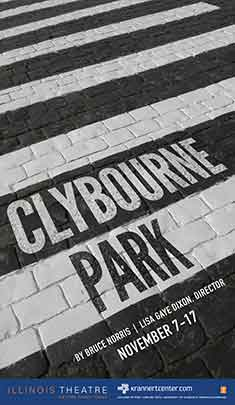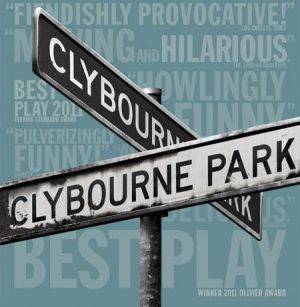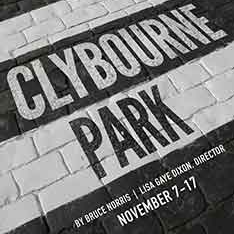Bruce Norris’ Clybourne Park is unsettling from the outset, trapping its characters and audience in a singular open space that shrinks into a claustrophobic, cross-century dwelling filled with ghosts of the Korean War, mental depression, and the racial and political unrest that’s lowering its weight onto the neighborhood. It’s a thoughtful and thought-provoking play, directed by Lisa Gaye Dixon with the requisite precision needed to leave audiences with a bad taste in their mouth.
Clybourne Park commences where Lorraine Hansberry’s optimistic vision, A Raisin in the Sun, left us. In the end of Raisin, the Youngers, a black Chicago family, move into the white neighborhood of Clybourne Park in their pursuit of the American Dream. But in Norris’ vision of Clybourne, the tensions surrounding race and the underlying issues that did and continue to plague humankind are at the forefront, leaving optimism as a mere fleeting thought.
 Clybourne Park is set in two eras—Act I in 1959 and Act II in 2009—in the fictional white neighborhood of Clybourne Park. As events unfold, we learn that the two time periods and the core of Clybourne’s inhabitants are more alike than it appears at surface level. The dialogue builds from distilled calm to slow simmer to full–out boiling rage, revealing characters’ underlying emotions layer by layer.
Clybourne Park is set in two eras—Act I in 1959 and Act II in 2009—in the fictional white neighborhood of Clybourne Park. As events unfold, we learn that the two time periods and the core of Clybourne’s inhabitants are more alike than it appears at surface level. The dialogue builds from distilled calm to slow simmer to full–out boiling rage, revealing characters’ underlying emotions layer by layer.
As dramaturg Jacob Davis details in his program note, playwright Bruce Norris called Clybourne Park “a play for white people…about the white response to race, about being the power elite, about being the people who have power in the race argument.” This is first revealed during the uprooting of 1959 Clybourne residents Russ (played by Neal Moeller) and Bev (Cassandra Cushman).
The plot details are entrenched in the characters’ emotions and motivations, and they are too complex to fully disclose in this review. Essentially, Russ and Bev are headed to a new neighborhood, escaping painful memories and daydreaming about Russ’s quicker daily commute. It is their visitors on one emotional day that bring out suppressed feelings of want, loss, indifference, and flat-out racism. The keys here are the details, the subtle nuances and character-affirming statements.
One of these is Francine (Akua Sarhene), Russ and Bev’s domestic worker, and her husband Albert’s (Preston “Wigasi” Brant) insistance to Bev that they have their own things and don’t need or want Russ and Bev’s. It’s a telling, symbolic persistence affirming their proud heritage, their will to earn and have what is in their means, and to dispel any notions that “people like them” are trying to take anything from the white folks of the community.
Another key here is the entrance of Karl (Nick Narcisi) and his pregnant and deaf wife Betsy (Margaret Kellas). Karl is quite particular, verbose, and a proponent of saving the identity of the neighborhood from “these people.” He is not to be reasoned with or quelled and believes that “You can’t live in a principle. You live in a house.” It’s Karl’s outright refusal to stop talking that really accelerates the rage in the room, a process initially furthered by Jim (Ryan Smetana), a seemingly innocuous priest that cuts at the thin emotional strings of Russ.
 Clybourne Park in 2009 is much different demographically but the critical problems surrounding its inhabitants—or those who are moving into the neighborhood in this case—have not vanished. A lot of small talk leads to increasing frustrations, blatant disrespect, and a debate about historical implications, racial tendencies, stereotypes, and ignorance.
Clybourne Park in 2009 is much different demographically but the critical problems surrounding its inhabitants—or those who are moving into the neighborhood in this case—have not vanished. A lot of small talk leads to increasing frustrations, blatant disrespect, and a debate about historical implications, racial tendencies, stereotypes, and ignorance.
Clybourne Park is a punch in the gut. Audiences should anticipate its heaviness but embrace the artistry of the play itself and the amazing work of the cast and crew. It’s essentially flawless from top to bottom in its production, its lighting (thanks to Lighting Director Lauren Tyler), its costumes (Aimee Beach, the Theatre 550 Costume Design Class, Nicole Faurant, designer supervisor, Pingwei Li, and Laura Molander), and its scenic design (Joe C. Klug). Actors Moeller, Brant, Sarhene, and Henry Steinken filled me with empathy, hurt, and rage, while Cushman, Kellas, Narcisi, Smetana captivated me with their portrayal of each character’s energy, humor, optimism, and ignorance.
Clybourne Park continues at Krannert Center’s Studio Theatre November 12-16 at 7:30 p.m., and on Sunday, November 17 at 3 p.m. The production contains adult language and is intended for mature audiences only.








